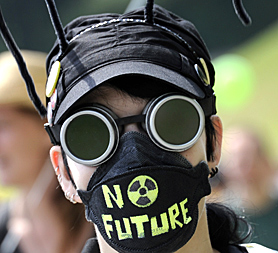Germany plans nuclear power U-turn
Germany announces plans to shut down all its nuclear reactors by 2022, in a policy u-turn prompted by Japan’s Fukushima disaster.
Chancellor Angela Merkel‘s ruling coalition said it plans to cut power use by 10 percent by 2020, taking eight of 17 nulcear plants offline now and another six by 2021.
The proposal may be even more ambitious than the nuclear exit planned when the Social Democrats (SPD) and Greens were in power in 2000. But it could still face opposition from utilities.
The coalition, sensitive to accusations it may increase dependence on highly polluting brown coal, may be hard pressed to present the plan as anything but a political defeat at the hands of Social Democrat and resurgent Green rivals.
Only nine months ago Merkel announced an extension of the lifespan of unpopular nuclear plants by an average 12 years. In March, after Japan’s earthquake and tsunami, she reversed that and put Germany‘s entire energy strategy under urgent review.
“Our energy system has to be fundamentally changed and can be fundamentally changed. We want the electricity of the future to be safer and, at the same time, reliable and economical,” Merkel said.
To accompany the nuclear exit, Germany plans to double the share of renewable energy sources to 35 percent over the same period, according to a government paper seen by Reuters.
Merkel did not outline further details of the plan but the government paper said Germany’s goal of reducing greenhouse gas emissions by 40 percent by 2020 remained in place.

Most voters in Germany oppose atomic energy, which provided 23 percent of overall power before the seven oldest stations were shut down in March.
A disputed 2.3 billion euro a year tax on spent fuel rods will not be scrapped even as the coalition plans to go ahead with the shutdown, Environment Minister Norbert Roettgen said after late-night talks in the Chancellor’s office between leaders of the centre-right coalition.
“(It’s) definite: the latest end for the last three nuclear power plants is 2022,” Roettgen said. Merkel’s about-turn has done little to gain her support, but has drawn scorn from the opposition and within her own party ranks. Tens of thousands of people demonstrated against nuclear energy at the weekend all across Germany.
Nuclear policy is heavily disputed in Germany and the issue has helped boost the Greens, which won control of one of the CDU’s stronghold states, Baden-Wuerttemberg, in a March vote.
Merkel’s majority in the Bundesrat upper house, where the states are represented, vanished last year after the CDU failed to hold onto the populous North Rhine-Westphalia state. Losing Baden-Wuerttemberg, a vote held in the shadow of the Fukushima nuclear crisis, dealt another blow to Merkel’s authority.
Germany’s largest power provider RWE, which had suggested ending nuclear power in 2025, signalled its opposition to the deal. A spokesman for the company said the firm would keep “all legal options open”.